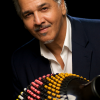Home » Jazz Musicians » Louie Cruz Beltran
Louie Cruz Beltran
Louie Cruz Beltran has crafted a musical career built upon the soulful sounds of his ethnic background and flavored with the edge of contemporary R&B, Jazz and Pop. Steeped in music from early childhood, Beltran's first memories recall his mother singing gospel and Mexican folk tunes.
"My mother was always singing and liked to play piano. There was always music in the house. She loved to sing everything from church hymns to Benny Goodman hits, but to me Mom always sounded prettiest in Spanish."
By the time he reached the third grade, Beltran was experimenting with rhythms on the bongos and learning to play the guitar. In high school he joined The Sadistic Velvet Blues, a self-proclaimed hippie band following the influences of The Rolling Stones and Iron Butterfly.
However, it was the early recordings of artists such as Ray Barretto, Mongo Santa Maria and Perez Prado that sparked Louie's interest. Captivated by the Afro-Cuban beat he chose to pursue the art of percussion, specializing in the congas and timbales. "The beauty of Afro-Cuban music stole my heart," Beltran said, "I was born to play congas. I am a rumbero."
Beltran began his formal music education while attending Bakersfield City College in the early 1970's. He played with the Bakersfield Jazz Ensemble under the direction of Doc Woods and later worked as a percussionist on "The Writer's Album" as a member of the Cal State Jazz Ensemble under the direction of Charles Argersinger.
An active participant in political demonstrations led by Caesar Chavez, Beltran met his first true conga teacher at a UFW strike. Puerto Rican born Jorge Claudio introduced Louie to fundamental rhythms, such as the Tumbao, and the rhythms of Puerto Rico and Cuba. "Jorge's teaching was an unselfish gift. He will be my friend forever.
"Later, during a trip to the Bay Area, Louie had the honor of meeting the legendary Coke Escovedo who was impressed by Beltran's enthusiasm and talent. Escovedo became Beltran's first professional mentor, inviting the young musician to perform with him on a number of occasions and encouraging him to pursue his goals. "Coke's impact on my life is simply indescribable. His encouragement was instrumental in my decision to become a professional musician. His spirit remains with me siempre por vida.
"Years later fate would re-connect Beltran to the Escovedo family when he met and performed with Coke's brother, Pete Escovedo, at a memorial benefit for a mutual friend. Since then, Louie and Pete have shared the stage on a number of occasions and developed a deep respect for one another.
Read moreTags
Louie Cruz Beltran: It's My Time

by Elena Walker
Musicians dream of the day they can record a CD, free from considerations beyond a pure presentation of their music. That day arrived for Louie Cruz Beltran with the completion of his first solo album. After over three decades playing and recording with such luminaries as virtuoso percussionist Francisco Aguabella, guitarist Mary Osborne, violinist Jean Luc Ponte, and Latin American greats Coke and Pete Escovedo, it's Louie's time!
Beltran has created an opportunity for the world to hear the music ...
read moreLouie Cruz Beltran Performs Tribute to Willie, Mongo and Cal!

Source:
Michael Ricci
Hollywood, CA.—Noted percussionist and bandleader Louie Cruz Beltran returns to Catalina's Jazz Club January 27th to perform a special tribute to three influential figures in the history of Latin Jazz—Mongo Santamaria, Willie Bobo, and Cal Tjader. Beltran, whose high energy showmanship draws from a rich variety of jazz, R&B and pop influences, has long admired and been inspired by these three iconic figures. The show will feature their music, and will shed light on their lives and careers. Beltran headlines ...
read more
Warm Nights, Cool Sounds at Descanso Gardens (CA)

Source:
All About Jazz
Corniche Entertainment and Descanso Gardens are presenting a series of evening concerts at beautiful Descanso Gardens in La Canada/Flintridge this summer. The series, called Warm Nights, Cool Sounds, takes place at the Under the Oaks Theatre, and features Latin-flavored jazz from some of Southern California's finest Latin jazz artists. Opening the series on Thursday, July 23rd is the Robert Kyle Brazilian Trio. On Thursday, July 30th the Louie Cruz Beltran Latin Jazz Ensemble appears, and on Thursday, August 6th, Mitchell ...
read more
Louie Cruz Beltran at the Edison Downtown!

Source:
All About Jazz
This Valentine's Day, February 14th, The Louie Cruz Beltran Latin Jazz Ensemble will be performing at the Edison Downtown, 102 W. 2nd Street, #101 (ph. 213-613-0000) from 7:30 11:30. The Edison was named one of the best new bars in America by Esquire Magazine. It is the premier nightspot in the burgeoning downtown scene. Come early for the best happy hour in Los Angeles - a 1910 martini at a 1910 price (35 cents) - and stay for the best ...
read more
Photos
Music
Recordings: As Leader | As Sideperson

















